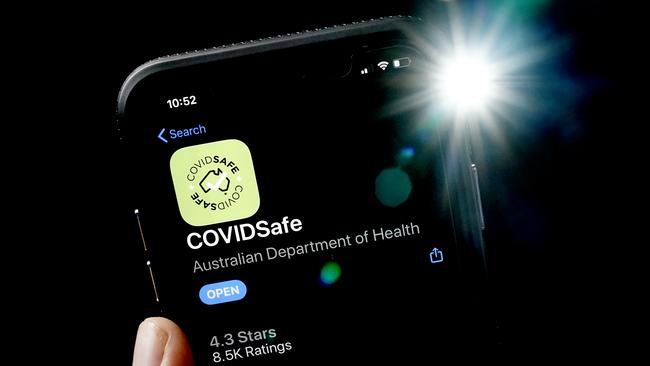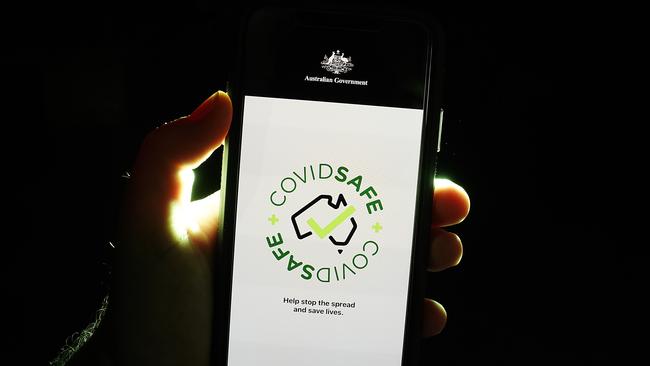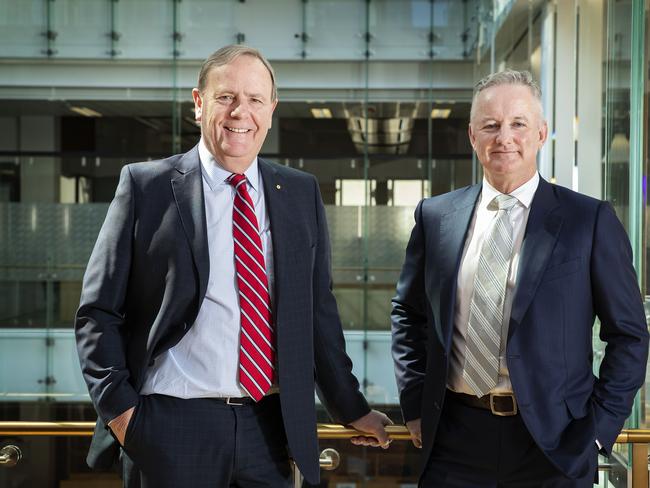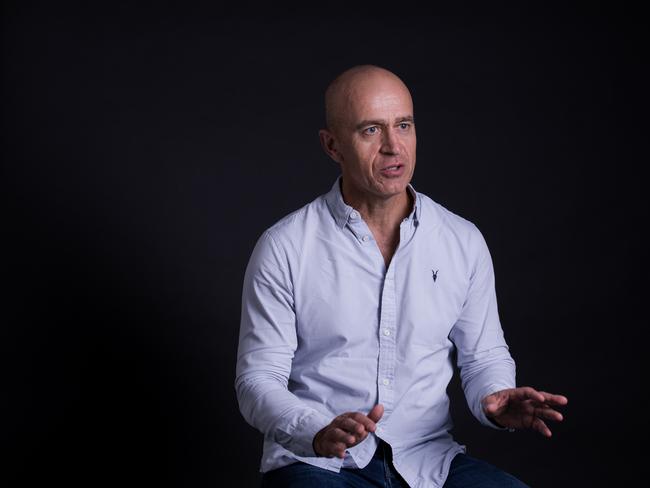Contact tracing comes built into phones
Users wanting to trace their exposure to COVID-19 won’t need to download an app in some countries.

Hello and welcome to The Download, The Australian’s technology blog for the latest tech news.
Chris Griffith 3.00pm Apple, Google roll out contact tracing with no app download
Users wanting to trace their exposure to COVID-19 won’t need to download an app. That’s the case in countries using an “exposure notification system” developed by Apple and Google.

Apple today announced that a new version of its iPhone operating system iOS 13.7 includes this contact tracing feature. It is installed as part of a regular operating system upgrade. Android phones will also get the capability via an Android 6.0 upgrade later this month. Techcrunch.com reports that the Android upgrade will auto-generate the COVID-19 monitoring app.
Users in countries that implement this will receive a notification that the system upgrade includes a contact tracing capability and will be invited to opt in. By relieving users of the need to download an app, this system is expected to increase the number of people with coronavirus contact monitoring. It also relieves countries of having to develop their own apps.
Australia has not adopted the Apple-Google system. It instead developed its own COVIDSafe app which is installed manually, and ran an ad campaign to encourage people to install it.
David Swan, Eli Greenblat 1.30pm Costello launches Facebook missive
Future Fund and Nine Network chair Peter Costello has launched a blistering attack on Facebook’s threats to shut down news in Australia, declaring that the tech platform would become a ‘great repository for fake news’ and that the company cannot be trusted.
“If Facebook doesn’t want to carry reputable Australian news, what is it going to carry? Disreputable Australian news,” Mr Costello told reporters on Wednesday. “Facebook says we don’t want to carry news from media organisations in Australia t where there is fact checking, where people stand behind it, where they can be sued for libel.
“It will become a great repository for people creating fake news out of China, Russia, or Australia or wherever, it‘s just that you wont be able to believe anything you read on Facebook.”
The former federal treasurer added that Facebook‘s threats on Tuesday laid bare the company’s true colours.

“It was really illustrated to me where Facebook is coming from, much more important than whether the news is reputable or reliable to them, is how much money they make out of it, and that distinguishes it in my view between Facebook and a real news organisation,“ he said.
“A real organisation has to stand behind its product and for that reason it wants to be accurate, and for that reason you can actually trust it.”
According to Mr Costello, if Facebook was to remove news from its platform in Australia, it would further undermine faith in the electoral process, given the rampant misinformation and conspiracy theories already on the platform. He said that Facebook has already had undue influence on elections, particularly in the US.
“It has been going on in the United States for the last four years. [Facebook] pumps media out which is not verified and not fact checked … I saw today the government says it is not going to be intimidated by Facebook and nor should it be intimidated by Facebook, it is a private corporation run for profit.
“It has no obligation to Australia or the Australian people, and its threats just illustrate this and as far as it is concerned it is not going to accept anything that it perceives as interfering with its profitability, so I welcome the fact the Australian government said it is not going to be intimidated by this and nor should they be.”
The comments came just hours after Nine chief executive Hugh Marks called Facebook‘s threats an ’abuse of monopoly power’ in an interview on Wednesday.
“They are a monopoly,” he told ABC Radio. ”There‘s only one social platform, it’s a monopoly, and we haven’t been able to negotiate a commercial outcome because of that monopoly position.
“They have an obligation like we all do to ensure that whatever service they‘re providing to Australians has a degree of reliability and honesty and transparency, and these are standards they’ve shied away from over time.
“So to then take the next step of actually excluding reliable news sources from the platform, how that serves their audience or the community … This would be a disservice to Australians. I‘m a bit bemused by their claims.”
David Swan 9.30am Tesla launches $US5bn capital raise
Tesla launches $US5 billion capital raise, tapping in on share surge
Tesla on Tuesday unveiled its biggest program of new share sales as a public company, seeking to cash in on soaring Wall Street interest in the electric carmaker to raise up to $US5 billion ($6.78bn) that will ease future debt pressures.
The move comes a day after a 5-for-1 stock split took effect, Tesla’s first since its initial public offering in June 2010, and follows a nearly six-fold increase in the value of its shares this year.
Tuesday’s share sale comes as Tesla seeks to massively expand production of its existing vehicles and build new factories near Berlin, Germany and Austin, Texas. The company also plans to launch new lines of vehicles, including a semi-truck called the Tesla Semi and its futuristic Cybertruck.
Tesla said it plans to use proceeds from the offering to strengthen its balance sheet and for general corporate purposes.
Craig Irwin, a Roth Capital Partners analyst who has the equivalent of a ‘hold’ rating on the stock, on Tuesday said the capital raise did not come as a surprise.
“They will need cash for all the facilities they are building, and new growth initiatives,” Irwin said.
Ten major banks, including Goldman Sachs, Bank of America Securities, Citigroup Global Markets and Morgan Stanley, will conduct the sale, the electric carmaker said in a filing, giving no deadline for its completion.
David Whiston, an analyst at Morningstar Research, said it remained to be seen how much money Tesla will ultimately raise. The company had $US8.6 billion in cash and cash equivalents at the end of June.
“I can understand them taking advantage of the stock’s incredible run, but they don’t need the money right now,” Whiston said.
Tesla in February had announced plans to raise $2 billion in a stock offering.
Tesla shares, which rose about 8 per cent in early premarket trading, retreated to trade about 1 per cent higher on the day after the news.
The company’s high-flying stock has risen another 70 per cent since the split was announced on August 11, and was trading at over $US2,000 before the division on Friday.
With a market capitalisation now around $US465 billion, it became the world’s biggest car company by value in July and has propelled Chief Executive Officer Elon Musk’s personal fortune past $US100 billion.
Musk has repeatedly assured investors over the past year that Tesla would not need to raise more money for costly expansion initiatives or to pay down debt.
David Swan 9.30am Facebook ‘should pay for content’
Facebook’s former Australia CEO, Stephen Scheeler, has waded into the debate around whether the tech giant should fairly pay media companies for using their journalism.
“I think Facebook should pay for content,” Mr Scheeler told the Today Show on Wednesday.
“I am a proud former Facebook executive. So this is clearly a – it‘s a negotiating tactic by Facebook to an extent to say here is the bad things that could happen if we don’t get what we want in this investigation.”

It comes after Treasurer Josh Frydenberg declared he wouldn’t be intimidated by scare tactics from Facebook and Google, after the tech giants threatened to effectively ban news content on their platforms if world-first regulation passes in Australia.
Mr Frydenberg told The Australian that the government would push ahead with its plans to force the tech giants to pay media companies fairly for news, despite Facebook’s outburst on Tuesday.
“Australia makes laws that advance our national interest. We don’t respond to coercion or heavy handed threats wherever they come from,” Mr Frydenberg said.
“Our reforms to digital platforms are world leading and following a ground breaking 18 month inquiry by the ACCC.
Google and Facebook will both be covered by the mandatory code announced last month, and will have to pay media outlets for news, and face fines of up to $10m if they fail to treat Australian media companies fairly.
The digital platforms will also be required to give media companies 28 days’ notice if algorithm changes are likely to materially affect referral traffic to news, and publishers will need to be informed of substantial changes to the display and presentation of news.



To join the conversation, please log in. Don't have an account? Register
Join the conversation, you are commenting as Logout